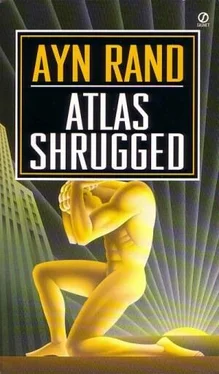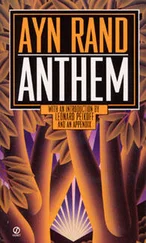"The intention's plain selfishness, if you ask me," said Rearden's mother. "Another man would bring a diamond bracelet, if he wanted to give his wife a present, because it's' her pleasure he'd think of, not his own. But Henry thinks that just because he's made a new kind of tin, why, it's got to be more precious than diamonds to everybody, just because it's he that's made it. That's the way he's been since he was five years old—the most conceited brat you ever saw—and I knew he'd grow up to be the most selfish creature on God's earth."
"No, it's sweet," said Lillian. "It's charming." She dropped the bracelet down on the table. She got up, put her hands on Rearden's shoulders, and raising herself on tiptoe, kissed him on the cheek, saying, "Thank you, dear."
He did not move, did not bend his head down to her. After a while, he turned, took off his coat and sat down by the fire, apart from the others. He felt nothing but an immense exhaustion.
He did not listen to their talk. He heard dimly that Lillian was arguing, defending him against his mother.
"I know him better than you do," his mother was saying. "Hank Rearden's not interested in man, beast or weed unless it's tied in some way to himself and his work. That's all he cares about. I've tried my best to teach him some humility, I've tried all my life, but I've failed."
He had offered his mother unlimited means to live as and where she pleased; he wondered why she had insisted that she wanted to live with him. His success, he had thought, meant something to her, and if it did, then it was a bond between them, the only kind of bond he recognized; if she wanted a place in the home of her successful son, he would not deny it to her.
"It's no use hoping to make a saint out of Henry, Mother," said Philip. "He wasn't meant to be one."
"Oh but, Philip, you're wrong!" said Lillian. "You're so wrong! Henry has all the makings of a saint. That's the trouble." What did they seek from him?—thought Rearden—what were they after? He had never asked anything of them; it was they who wished to hold him, they who pressed a claim on him—and the claim seemed to have the form of affection, but it was a form which he found harder to endure than any sort of hatred. He despised causeless affection, just as he despised unearned wealth. They professed to love him for some unknown reason and they ignored all the things for which he could wish to be loved. He wondered what response they could hope to obtain from him in such manner—if his response was what they wanted.
And it was, he thought; else why those constant complaints, those unceasing accusations about his indifference? Why that chronic air of suspicion, as if they were waiting to be hurt? He had never had a desire to hurt them, but he had always felt their defensive, reproachful expectation; they seemed wounded by anything he said, it was not a matter of his words or actions, it was almost . . . almost as if they were Wounded by the mere fact of his being. Don't start imagining the insane —he told himself severely, struggling to face the riddle with the strictest of his ruthless sense of justice. He could not condemn them without understanding; and he could not understand.
Did he like them? No, he thought; he had wanted to like them, which was not the same. He had wanted it in the name of some unstated potentiality which he had once expected to see in any human being. He felt nothing for them now, nothing but the merciless zero of indifference, not even the regret of a loss. Did he need any person as part of his life? Did he miss the feeling he had wanted to feel? No, he thought. Had he ever missed it? Yes, he thought, in his youth; not any longer.
His sense of exhaustion was growing; he realized that it was boredom.
He owed them the courtesy of hiding it, he thought—and sat motionless, fighting a desire for sleep that was turning into physical pain.
His eyes were closing, when he felt two soft, moist fingers touching his hand: Paul Larkin had pulled a chair to his side and was leaning over for a private conversation.
"I don't care what the industry says about it, Hank, you've got a great product in Rearden Metal, a great product, it will make a fortune, like everything you touch."
"Yes," said Rearden, "it will."
"I just . . . I just hope you don't run into trouble."
"What trouble?"
"Oh, I don't know . . . the way things are nowadays . . . there's people, who . . . but how can we tell? . . . anything can happen. . . ."
"What trouble?"
Larkin sat hunched, looking up with his gentle, pleading eyes. His short, plumpish figure always seemed unprotected and incomplete, as if he needed a shell to shrink into at the slightest touch. His wistful eyes, his lost, helpless, appealing smile served as substitute for the shell. The smile was disarming, like that of a boy who throws himself at the mercy of an incomprehensible universe. He was fifty-three years old.
"Your public relations aren't any too good, Hank," he said. "You've always had a bad press."
"So what?"
"You're not popular, Hank."
"I haven't heard any complaints from my customers."
"That's not what I mean. You ought to hire yourself a good press agent to sell you to the public,"
"What for? It's steel that I'm selling."
"But you don't want to have the public against you. Public opinion, you know—it can mean a lot."
"I don't think the public's against me. And I don't think that it means a damn, one way or another,"
"The newspapers are against you."
"They have time to waste. I haven't."
"I don't like it, Hank. It's not good."
"What?"
"What they write about you."
"What do they write about me?"
"Well, you know the stuff. That you're intractable. That you're ruthless. That you won't allow anyone any voice in the running of your mills.
That your only goal is to make steel and to make money."
"But that is my only goal."
"But you shouldn't say it."
"Why not? What is it I'm supposed to say?"
"Oh, I don't know . . . But your mills—"
"They're my mills, aren't they?"
"Yes, but—but you shouldn't remind people of that too loudly. . . .
You know how it is nowadays. . . . They think that your attitude is anti-social."
"I don't give a damn what they think,"
Paul Larkin sighed.
"What's the matter, Paul? What are you driving at?"
"Nothing . . . nothing in particular. Only one never knows what can happen in times like these. . . . One has to be so careful . . ."
Rearden chuckled. "You're not trying to worry about me, are you?"
"It's just that I'm your friend, Hank. I'm your friend. You know how much I admire you."
Paul Larkin had always been unlucky. Nothing he touched ever came off quite well, nothing ever quite failed or succeeded. He was a businessman, but he could not manage to remain for long in any one line of business. At the moment, he was struggling with a modest plant that manufactured mining equipment.
He had clung to Rearden for years, in awed admiration. He came for advice, he asked for loans at times, but not often; the loans were modest and were always repaid, though not always on time. His motive in the relationship seemed to resemble the need of an anemic person who receives a kind of living transfusion from the mere sight of a savagely overabundant vitality.
Watching Larkin's efforts, Rearden felt what he did when he watched an ant struggling under the load of a matchstick. It's so hard for him, thought Rearden, and so easy for me. So he gave advice, attention and a tactful, patient interest, whenever he could.
"I'm your friend, Hank."
Rearden looked at him inquiringly.
Larkin glanced away, as if debating something in his mind. After a while, he asked cautiously, "How is your man in Washington?"
Читать дальше










